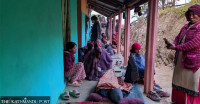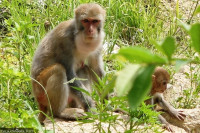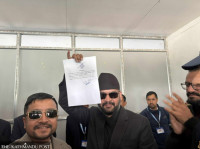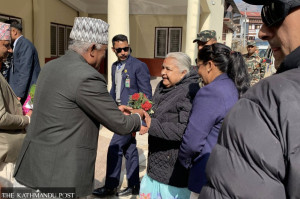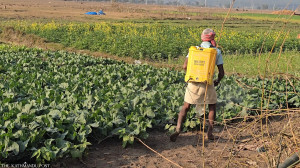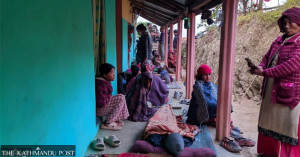Koshi Province
The singing lawmaker shaking up Koshi politics
Maoist Assembly member Gombu Sherpa takes on the government in verse—earning viral fame.
Parbat Portel
In the Koshi Province Assembly, when Gombu Sherpa rises to speak, lawmakers become more attentive—not for a traditional political speech, but for a song.
Known popularly as ‘Gitange Mananiya’ (the singing lawmaker), Sherpa has turned protest into performance, delivering critiques of the government in biting, poetic verses.
Elected from Solukhumbu 1(1) as Maoist Centre candidate, Sherpa doesn’t just raise questions in the Assembly—he sings them. “I started humming out of frustration with the government’s activities,” he said. “My voice isn’t that great, but I can carry a tune.”
Sherpa began singing when he was in student politics in the late 1990s, when he was associated with the UML’s student wing. He later joined the Maoist movement and even spent 11 months in jail during the insurgency.
Locally, he’s known as Karjyang, and he proved his popularity in the 2022 provincial elections by defeating former state minister Uttam Kumar Basnet of the UML by a margin of 1,637 votes.
In Assembly meetings, Sherpa frequently takes the floor—sometimes during special-hours, sometimes during zero-hours. But unlike others reading from notes, Sherpa lets his lyrics do the talking.
At a recent meeting, he protested unannounced power cuts with the following verse:
“Nali ma mukh gadchhau kina ho sarkar,
Ghus khori bhrastachar gareu atyachar.”
(Why are you burying your face in the drain, government?
You committed injustice, fuelled by bribes.)
He continued:
“Kata hideko bijuli marera,
Kulman phalera, bhrasta palera, dalal palera.”
(Where did the electricity go, after sacking Kulman, promoting the corrupt and protecting brokers?)
Sherpa’s message about public apathy and government misconduct struck a chord:
“Janata andhakarma, sarkar bhrastacharma,
janata hereko heryai, sarkar haseko hasyai,
yasto garna painna, aba dherai sahinna.”
(The people are in darkness, the government is in corruption,
The people just keep watching, the government keeps laughing.
This cannot go on; we won’t tolerate it any longer.)
Sherpa’s words drew applause from across the assembly. His style may be unorthodox, but it strikes a chord—with both the public and fellow lawmakers.
On June 6, during a debate over the controversial visit visa scandal—allegedly involving the federal home minister—Sherpa’s lyrical protest again went viral:
“Visit visa ma hajur, visit visa ma, bhuin chhodera jane hajur, paschim disha ma.”
(On a visit visa, my dear, on a visit visa, leaving the ground behind, you’re flying to the west.)
His verse, shared widely on social media, has drawn hundreds of thousands of views, turning Sherpa into a household name online.
On July 21, Sherpa took aim at government spending in Gauradaha, alleging Rs 1.1 million was channelled to a single pond over three years, with ties to the chief minister’s brother. Adapting a folk tune, he sang:
“Gauradaha ko bajarai ma maya hamro basyo,
kaso gari bhulne hola, man udi gayo.”
(Our love bloomed in the market of Gauradaha.
How could I ever forget — my heart flew away.)
His satirical twist drew laughter from both ruling and opposition benches, but the message was clear: misuse of public funds in the name of development will not go unquestioned.
Sherpa doesn’t read speeches. He sings them. And in doing so, he channels the pain and frustration of ordinary people into powerful, lyrical protest.
Sherpa’s songs blend satire with serious critique, capturing attention across political divides. “Our politics is becoming dirtier. We must be the ones to clean it up,” he said.
In the cold chambers of provincial politics, Sherpa’s songs echo as both resistance and hope—simple tunes carrying heavy truths.




 18.12°C Kathmandu
18.12°C Kathmandu

